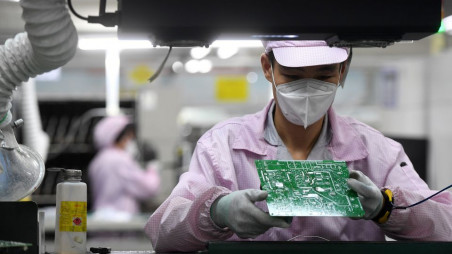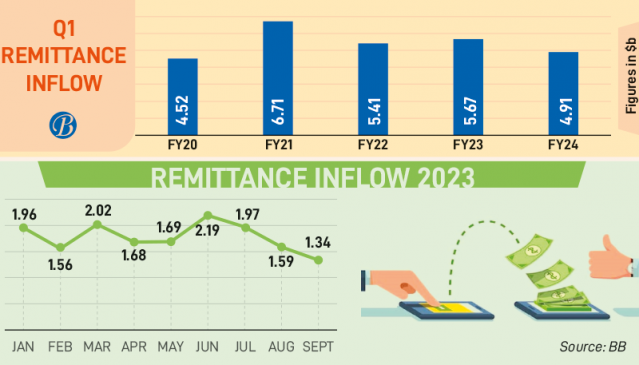Chinese tech makes local manufacturers, exporters competitive: Stakeholders
Bangladesh imported $19.2 billion worth of goods from China in FY23, which was 27.7% of the country’s total import
An employee inspects a circuit board on the controller production line at a Gree factory, following the coronavirus disease (Covid-19) outbreak in Wuhan, Hubei province, China August 16, 2021. Photo :Reuters
Highlights:
- Shasha Denims MD says 98% of agro machineries in Bangladesh are Chinese
- 20 years ago a western spinning machine was $90,000, the Chinese one was $20,000
- BGMEA president says Bangladesh can acquire technology and knowledge from China
- AK Khan Group says Western companies dominate high-end technology segments while China excels in basic technology
- Apparel industry slowly started shifting towards European technology after 2010 because of Europe's energy efficiency
Chinese technologies have become a blessing for Bangladesh's small and medium business entrepreneurs, making their products and services competitive across the world, according to experts and stakeholders.
Thanks to Chinese technology advancements Bangladesh has developed a strong manufacturing base in readymade garments, textiles, dyeing, printing, packaging, accessories, food and agro-processing, motorcycles, automobiles, mobile phones, electrical and electronics.
In some cases, large industries also depend on Chinese machinery as Western technology is priced much higher, they said.
Besides, many businesses in the service sector – telecommunications, hospitality, healthcare, wholesale and retail – are also growing with the help of Chinese technology.
According to data from the central bank, Bangladesh imported $19.2 billion worth of goods from China in the last fiscal, which was 27.7% of the country's total import cost.
Bangladesh mostly imports capital machinery and parts, raw materials – cotton, fabrics, man-made filaments, staple fibre, plastics and articles, iron and steel, pharmaceuticals and chemicals from China.
Fazlee Shamim Ehsan, CEO of Fatullah Apparel, said once their industry was fully dependent on Chinese technology. "Otherwise we couldn't have developed our industry at this level."
"About 20 years ago a western spinning machine was about $90,000, while the same machine in China was priced at $20,000," he added.
He mentioned that a large volume of garment machinery is still imported from China.
Faruque Hassan, president of BGMEA, said China is far advanced in man-made fibre industry. "If the government provides policy support, Bangladesh can acquire technology and knowledge from China."
Joint ventures could be the best option to transfer technology, he added.
Chinese technology has strong presence in Bangladesh's construction sector as well, with China's construction machinery giant Sany Group alone accounting for 30% of market share supplying equipment to major projects like Padma Bridge, Dhaka Elevated Expressway, Dhaka airport's third terminal and Rooppur Nuclear Power Plant along with renewable energy plants.
China Harbour Engineering Co. Ltd. (CHEC) has been providing industrial chain solutions to roughly 20 projects so far including ports, roads, rails and environmental protection.
And Huawei has been a leading partner of Bangladesh's journey towards digitalization.
Al Mamun Mridha, general secretary of Bangladesh China Chamber of Commerce and Industry, said Chinese companies have been instrumental in transforming Bangladesh.
"In the coming years, we aspire to further strengthen our ties, explore new avenues of cooperation, and continue to work towards mutual prosperity," he said.
"The Belt and Road Initiative has been a beacon of hope, and together we will continue to illuminate the path toward high-quality development and a brighter future for both our nations," Mridha added.
China leading basic tech
Abul Kashem Khan, a director at AK Khan Group, one of the oldest conglomerates in Bangladesh, said everyone has benefited from Chinese technology as it is a cost effective option against western alternatives. "The cost of doing business will be much higher without Chinese tech."
Those aiming to start small or medium-sized businesses with limited investment find China a suitable option, he said, adding that it is essential to scrutinise Chinese companies' backgrounds before procuring products and technology.
Western companies today dominate sophisticated machinery and high-end technology segments while Chinese companies excel in basic technology, he noted.
For example, China has made excellent progress in telecommunications technology. There are no smartphones without Chinese technology, all big mobile phone makers rely on China.
Rezwanul Hoque, CEO of Ismartu Technology BD, one of the leading mobile phone manufacturers in Bangladesh, said the industry has been growing in Bangladesh based on Chinese technology and capital machinery.
This sector has the potential to be next to RMG in the export market as it has gained knowledge, skilled manpower and experience to produce quality mobile phones.
Shanat Datta, chief financial officer of Runner Automobiles, said, "Our motorcycle industry started its journey through Chinese technology, capital machinery and raw materials."
His company now also imports technology from Japan, Korea and India.
"Our electrical, electronic and home appliance manufacturing sectors are mainly dependent on China for technology, capital machinery and raw materials," said Kamruzzaman Kamal, director marketing of Pran-RFL Group.
Catching up with European tech
Shams Mahmud, managing director of Shasha Denims, said, "After 2010, utility prices went up and the apparel industry slowly started shifting towards European technology because of their energy efficiency."
However, Shams said today's agro sector still uses about 98% Chinese machineries.
Besides, Fatullah Apparel CEO Eshan stated, "China can adopt western technology after one or two years of innovation. Initially they develop it for their own market and after 5-6 years they develop it for international markets."
Furthermore, a number of western manufacturers now produce their machines in China to make them competitive for the global market, Ehsan added.






